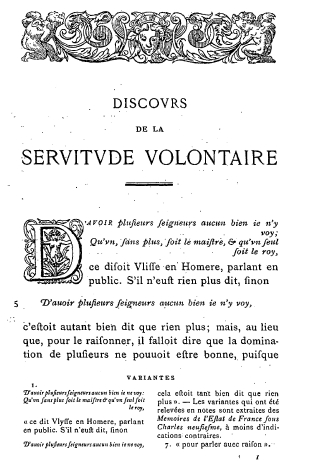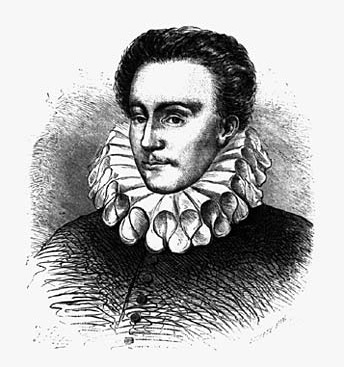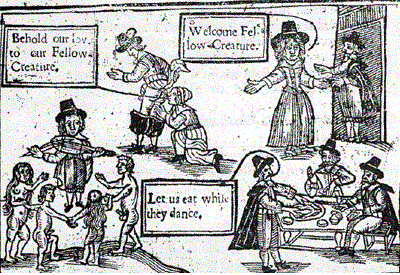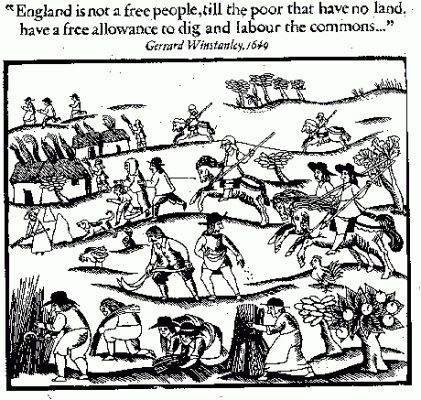Here is the second installment from the Afterword to Volume Three of my anthology of anarchist writings, Anarchism: A Documentary History of Libertarian Ideas, in which I survey the origins and development of anarchist ideas from ancient China to the present day.
Étienne de la Boétie and Voluntary Servitude
The Daoist sage Bao Jingyan argued that the strong and cunning forced and tricked the people into submitting to them. That the people may play a part in their own servitude is an idea that was explored in much greater detail by Étienne de la Boétie (1530-1563), in his Discourse on Voluntary Servitude (1552, Volume One, Selection 2). Seeking to explain how the masses can be subjugated by a single tyrant, de la Boétie argued that it is the masses themselves “who permit, or, rather, bring about, their own subjection, since by ceasing to submit they would put an end to their own servitude.” Despite de la Boétie’s focus on tyranny, rather than hierarchy and domination as such, as Murray Rothbard points out, de la Boétie’s critique of tyranny applies to all forms of government, whether democratic, monarchic or dictatorial, such that his arguments can easily be pressed on “to anarchist conclusions,” as they were by subsequent writers (1975: 20).
This idea that the power of the state depends on the voluntary submission or acquiescence of the people, such that state power can be abolished or undermined by the withdrawal of cooperation, was taken up by later anarchists, including William Godwin (Volume One, Selection 4), Leo Tolstoy (Volume One, Selection 47), Gustav Landauer (Volume One, Selection 49), Praxedis Guerrero (Volume One, Selection 72), Alex Comfort (Volume Two, Selection 26) and contemporary writers, such as Noam Chomsky (Volume Two, Selection 68) and Ed Herman (Volume Three, Selection 40), who have emphasized that so-called democratic states require an extensive propaganda apparatus to “engineer” or “manufacture” the consent of the people to their own continuing domination and exploitation.
Heresy and Revolution
While religion has often served as both a justification and palliative for coercive authority, various heretical religious currents have emerged throughout human history denying the legitimacy of earthly authority (Walter, Volume Two, Selection 43). In the 1960s, Gary Snyder highlighted those strands of Buddhism that evinced an anarchist sensibility (Volume Two, Selection 42). In the 9th century, a minority among the Mu‘tazili Muslims argued that anarchy is preferable to tyranny (Crone, 2000), while another Islamic sect, the Kharijites, “disputed any need at all for an imam, or head of state, as long as the divine law was carried out” (Levy, 1957).
In Europe, several heretical Christian sects emerged during the Middle Ages and Reformation, rejecting human authority in favour of freedom and community. The Brethren of the Free Spirit adopted a libertarian amoralism similar to Max Stirner’s egoism (Volume One, Selection 11), advocating total freedom for themselves while taking advantage of others (Marshall, 2008: 87-89). In contrast, the Taborites in Bohemia were egalitarians, seeking to abolish private property, taxes and political authority, asserting that “All shall live together as brothers, none shall be subject to another” (Marshall: 92). The Hussites and Moravian Brothers also advocated an egalitarian community without coercive authority, modeled after Christ’s relationship with his apostles.
But it was not until the English Revolution (1642-1651) that Christian teachings were transformed into a body of ideas resembling modern anarchism. The Ranters advocated and practiced free love and the holding of all things in common, with some adopting a libertarian amoralism similar to that of the Brethren of the Free Spirit. The Diggers also advocated holding things in common, and sought to establish egalitarian communities on waste lands.
Gerrard Winstanley and the Diggers
One of the Diggers, Gerrard Winstanley (1609-1676), published a pamphlet in 1649, The New Law of Righteousness, in which he advocated an early form of anarchist communism, drawing inspiration from the Bible (Volume One, Selection 3).
Winstanley argued that anyone getting “authority into his hands tyrannizes over others,” whether husband, parent, master or magistrate. He saw private property, inequality and exploitation as the inevitable result of “rule and dominion, in one part of man-kinde over another.” He advocated making the earth the “common treasury” of all, such that anyone in need should be able to “take from the next store-house he meets with.” There “shall be none Lord over others,” and “no need for Lawyers, prisons, or engines of punishment,” with the distinction between “Mine and Thine” having been abolished.
In opposing coercive authority, hierarchy and private property, Winstanley was careful to endorse means consistent with his ends. He endorsed a form of nonviolent direct action, while denouncing those who would replace one tyranny with another. For Winstanley, “the manifestation of a righteous heart shall be known, not by his words, but by his actions,” for “Tyrannie is Tyrannie in one as wel [sic] as in another; in a poor man lifted up by his valour, as in a rich man lifted up by his lands.”
Although couching his argument in religious terms, Winstanley conceived of God as “the law of righteousness, reason and equity” dwelling within all of us, a position similar to that later adopted by Leo Tolstoy. He advocated freedom for both men and women, applying his critique of hierarchy and domination not just to their more obvious manifestations, but also to relationships between husband and wife and parents and children.
Robert Graham
Additional References
Crone, Patricia. “Ninth-Century Muslim Anarchists.” Past and Present, No. 167. 2000.
Levy, Reuben. The Social Structure of Islam. Cambridge: Cambridge University Press, 1957.
Marshall, Peter. Demanding the Impossible: A History of Anarchism. London: Harper Perennial, 2008.
Rothbard, Murray. Introduction to Étienne de la Boétie, The Discourse on Voluntary Servitude. Montreal: Black Rose Books, 1975.





Nice piece, thx. But I hope there won’t be any more references to Murray Rothbard.
That will be the only neutral one.